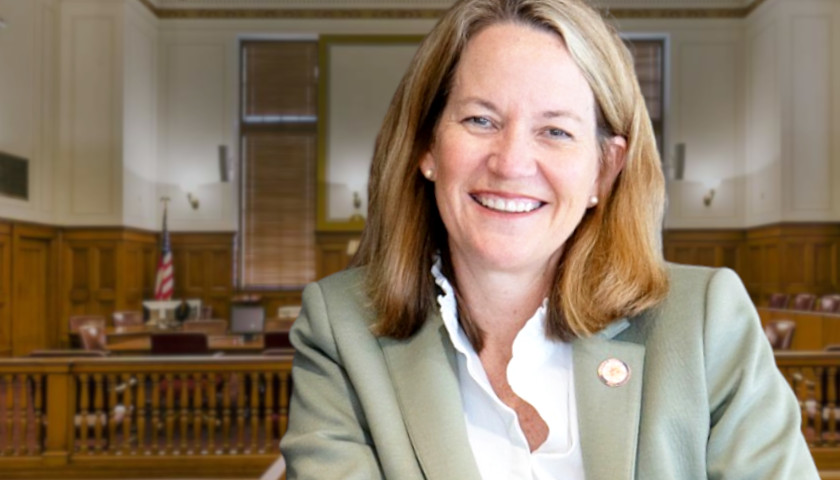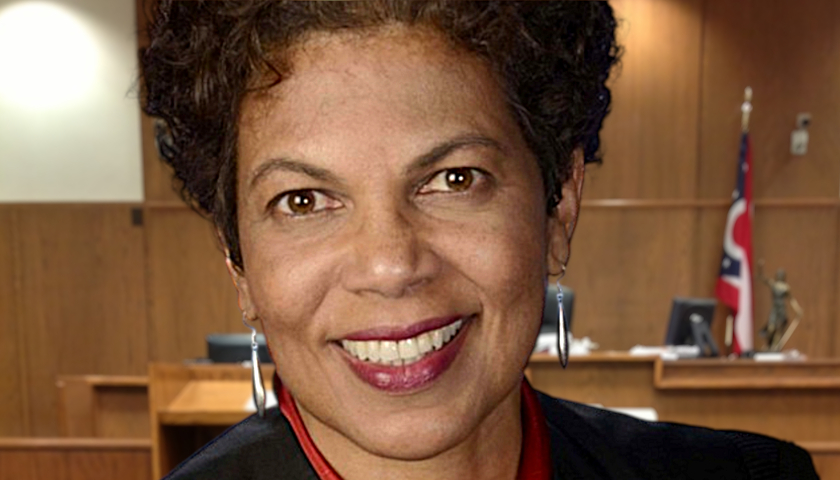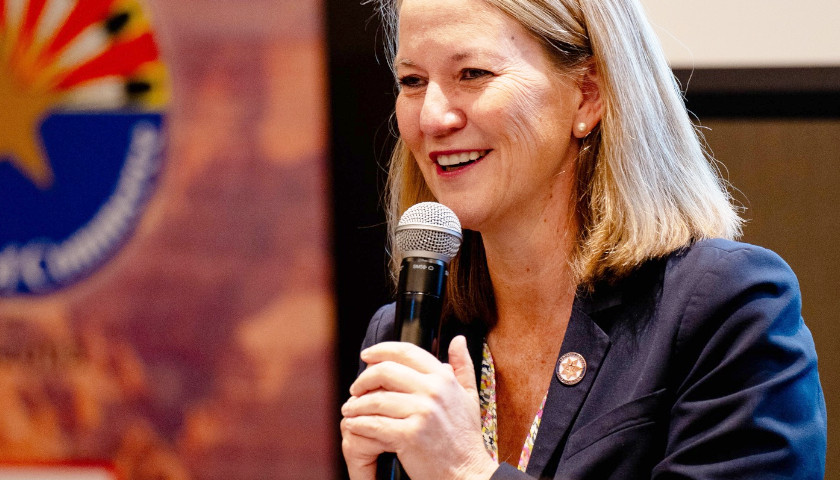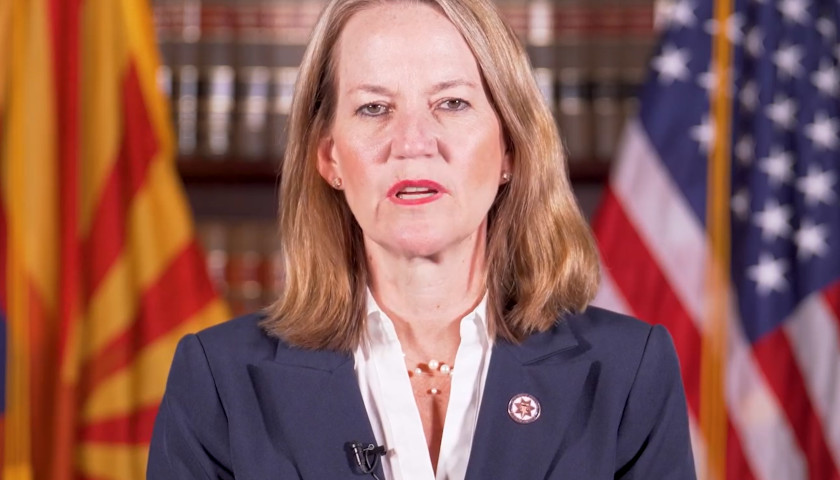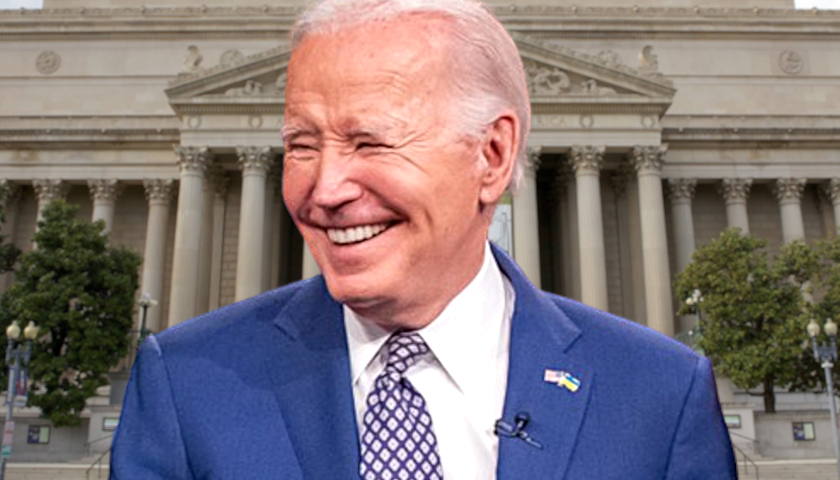Attorney General Kris Mayes held a press conference on Wednesday to announce the indictment of Arizona’s alternate slate of electors for former President Donald Trump in the 2020 election, along with other named and unnamed co-conspirators and unindicted co-conspirators including Trump.
Mayes made several incorrect assertions about the law.
She began her press conference by stating that “the defendants and other unindicted co-conspirators raised false claims of widespread voter fraud in Arizona to pressure elections officials to change the outcome of a transparent, free, and fair democratic election.”
However, many of those involved did not make accusations of “widespread voter fraud.” Those discussed in the indictment mainly questioned the illegal activity in a handful of swing states, which is considerably different from asserting “widespread voter fraud.”
Next, many involved did not try to pressure election officials to change the election outcome. They merely asked them to look into the illegalities and consider other possible avenues to address them. These options included launching investigations, reconvening the Arizona Legislature, and conducting recounts.
Mayes claimed that the election was “transparent, free, and fair,” but cybersecurity expert Shawn Smith testified during the disbarment trial of Trump’s former DOJ official Jeffrey Clark that a statement issued by federal election officials on November 12, 2020, declaring the election the most secure election was not accurate because those officials had not yet looked at the data.
Operations security expert Harry Haury, who helped draft the federal Help America Vote Act, testified during Clark’s trial that a statement put out shortly after the 2020 election by some officials and activists declaring that there was no fraud carried no weight. He pointed out that the lead signatory was a lawyer, and others were CEOs, not cybersecurity experts.
“This document means nothing to me,” he said.
Mayes said efforts to pressure officials to change the election results failed when “officials stood firm, followed their statutory duties.”
During the election, officials failed to follow their statutory duties when they allowed executable programs to be installed on voting machine tabulators in Maricopa County after the software had been approved, illegally altering it. Ben Cotton, an IT expert proficient in forensics and digital systems analysis and whose firm CyFIR was hired by the Arizona Senate in 2021 to audit the 2020 election, summarized his findings, “It is clear, based on my findings, that unauthorized programs, databases, configuration settings, and actions were present on the voting systems in Maricopa County for the elections in both 2020 and 2022.”
After the election, officials failed to follow their statutory duties when they refused to comply with letters and subpoenas from the Arizona Senate and the Arizona Attorney General’s Office (AGO) conducting investigations. The AGO sent Maricopa County officials four letters asking for documents and equipment, which the officials mostly ignored, failing to produce the requested items. Due to officials’ stonewalling, the Arizona Senate was unable to complete its independent ballot audit of the election in Maricopa County.
Mayes said the alternate electors “falsely claim[ed] to be the duly elected and qualified electors for president and vice president of the United States from the State of Arizona.” However, in several previous presidential elections, including Hawaii’s 1960 election, there were dueling slates of electors, and none of them were ever prosecuted.
In 2016, Democrats pressured electors to reverse the November election results to stop Trump from winning, and none of them were prosecuted. Nor were Democratic members of Congress prosecuted who objected to certifying the vote for the winning Republican presidential candidates in 2000, 2004, and 2016.
Mayes next claimed, “These defendants deceived the citizens of Arizona by falsely claiming that those votes were contingent only on a legal challenge that would change the outcome of the election. In reality, the defendants intended that the false votes for Trump and Pence would encourage Vice President Pence to reject the certified Biden-Harris electors’ votes regardless of the result of any legal challenge. ”
Ninety-two election lawsuits were filed over the 2020 election, including several in Arizona. Mayes assumed that the defendants had little interest in those lawsuits, yet in her indictment, she named defendants who were involved in election-related litigation, such as then-Arizona Republican Party Chair Kelli Ward, who was a plaintiff.
Mayes declared, “None of the legal challenges filed in Arizona state and federal courts regarding the 2020 election were remotely successful at any stage.”
She detailed how she said this to avoid admitting that Republican litigants were successful in one of the legal proceedings. In Maricopa v. Fann No. CV 2020-016840, Maricopa County officials sued the Arizona Senate in order to avoid responding to a Senate subpoena for records. The court ruled in favor of the Republican senators, holding, “[T]he Senators have the power to subpoena material as part of an inquiry into election reform measures.”
Mayes said the electors’ “scheme failed when Vice President Pence upheld the rule of law and accepted all certified Biden-Harris votes.”
This assumed that the “rule of law” meant the vice president had no substantive authority to accept or reject electoral slates. During the disbarment trial of Trump’s former attorney and constitutional scholar John Eastman, who is one of the unnamed co-conspirators, nationally renowned Berkeley constitutional law professor John Yoo testified extensively about how the vice president historically had substantive authority in this area. He said he’d only encountered one other legal expert who disagreed and reviewed historical examples where the vice president exercised that power.
State Senator Anthony Kern (R-Glendale), one of the indicted electors who has championed fighting lawfare against attorneys while serving in the Arizona Legislature, stated on Thursday, “When President Trump called for my aid, I answered,” he said. “My reward? A crooked Democrat Attorney General prosecuting me with 9 fabricated felonies. Washington D.C. needs courageous fighters like me, that’s why I’m running for Congress to change the system. My mission is simple, drain the swamp and restore our republic. I want to ensure future generations never see this political persecution.”
Kern is running for Congress in Arizona’s Eighth Congressional District, seeking to replace incumbent Debbie Lesko (R-AZ-08).
– – –
Rachel Alexander is a reporter at The Arizona Sun Times and The Star News Network. Follow Rachel on Twitter / X. Email tips to [email protected].
Photo “Kris Mayes” by Kris Mayes.

